University of Amsterdam Unveils the IAS Future Generation Series, Nurturing Innovation and Excellence
Humanity stands on the shoulders of its ancestors. Our world, societies, science, cities, bodies, and minds have been shaped by the generations before us, just like we are shaping the worlds future generations will live in. The discoveries we make today and the policy decisions we make tomorrow do not only affect current but also future generations. However, the voices of future generations are currently unheard in our scientific debates and our policy decisions. Therefore, the IAS has launched an interdisciplinary series of conversations between academia, policy makers and civil society to fuel a movement where science and research serve society. The IAS Future Generations series is committed to leveraging the power of science and research to catalyze positive societal change for the wellbeing of future generations.
Launch event
The aim is to support societal change to promote intergenerational justice, sustainability, and health for generations to come. On November 7th, the launch took place in the Allard Pierson museum. During the event, Institute for Advanced Study (IAS) director professor Huub Dijstelbloem explained that the Future Generations initiative matches the mission of the Institute for Advanced Study of the University of Amsterdam to advance cutting-edge interdisciplinary research that addresses complex scientific and societal challenges.
Connecting past and future
The initiator of the series, Tessa Roseboom, professor of Early Development and Health, UvA, aspires to not only create new knowledge through debate and research but also wants to make a big leap in knowledge transfer by co-creating with key stakeholders in society and policy in order to create value for future society. Her research has focused on how human beings are shaped by the environment in which they grew and developed in early life, which has fueled a nationwide government funded program as well as a societal movement towards building healthy generations. Her ambition with the Future Generations initiative is to connect our past to our future, and science to society and enhancing innovation and translation to practice and contribute to making progress towards the Sustainable Development Goals. This ambition is in line with the UvA strategic plan of Inspiring Generation.
Shaping the world of tomorrow
During the launch event, Rector Magnificus of the UvA, professor Peter Paul Verbeek highlighted that science seeks to understand and serve the world, and the UvA aims to contribute to a sustainable and prosperous future for all. This series seamlessly fits in the UvA mission to develop knowledge that helps tackle societal problems and help shape the world of tomorrow in an inclusive and intergenerationally just way. Sir Peter Gluckman, president of the International Science Council, highlighted the need for trust in science and a true transdisciplinary approach in his Keynote address at the Institute for Advanced Study, University of Amsterdam – Koi Tū: The Centre for Informed Futures.
Ombudspersons Jan van de Venis and Jessica den Outer from the Future Generations Lab invited the audience to envision their connection with their ancestors as well as their descendants and describe the world in which future generations will live. Professor Jet Bussemaker described how initiatives such as the national science agenda, which she initiated as a minister of Education, brings science and society closer together and will increase societal impact of research.
In line with the UvA Strategic Plan
The IAS Future Generations series cuts through the four IP themes of the UvA Strategic Plan to work towards (1) responsible digital transformations (2) fair and resilient societies (3) sustainability, and (4) healthy futures. As such, the initiative aims to inspire scientists (from every generation), policy makers and societal organisation to translate the science within these themes to society. It is the ‘springboard’ for making societal impact towards current and future generations. While the launch focused on the why of Future Generations, the next edition will focus on how to take future generations into account in our research and policy and the third edition will focus on what we need to do in practice to take the rights of future generations into account.
We are standing on the shoulders of the generations before us and we are laying the foundations for the world in which future generations will live. How were you formed by your past and what can you contribute to the future? Please join our community and our conversation at Future Generations.

